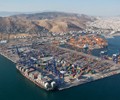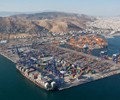

Over a decade ago, when Greece was trapped in a severe debt crisis and close to bankruptcy, Piraeus was still a decaying port standing at the fork of fate.
However, these years, Piraeus has been expanded, upgraded, linked to railway networks and regained its shine, after the China Ocean Shipping Company, also known as COSCO, began managing the port’s container terminals in the autumn of 2009.
Officials, observers and residents mark Piraeus as a successful example of China-Greece collaboration in the context of the Belt and Road Initiative (BRI), and data always tell the truth.
DATA & FACTS
In 2010, container handling in Piraeus totaled 880,000 twenty-foot equivalent units (TEUs), while in 2020 it reached 5.43 million TEUs, despite the challenges of COVID-19.
Thanks to its strong foundation, the port can stay resilient in the face of the unprecedented turmoil caused by the pandemic, said Tassos Vamvakidis, commercial manager of Piraeus Container Terminal S.A., the Chinese group’s Piraeus subsidiary, in an interview with Xinhua.
While such sectors as shipping, transport and supply chain suffered worldwide, Piraeus managed to weather the coronavirus storm in strict compliance with safety rules set by Greek authorities, he said.
Last year, though the port saw a roughly 3-percent reduction in terms of containers compared to 2019, the lost ground has been recovered.
“Overall, we think we managed well. This has been appreciated by our clients. We have not stopped even one day, because of the pandemic, to operate,” Vamvakidis said, adding that everybody here feels proud of this achievement.
Vamvakidis, 64, born and raised at Piraeus, has been working at the port since he was 16 and has since witnessed the fruitful cooperation between Greece and China.
The Chinese investment has significantly changed Piraeus’ image, as his company, which has managed the port’s container terminals since 2009, currently boasts advanced equipment, infrastructure and technology, he said.
Furthermore, the operator has offered local community with more than 3,000 direct jobs and even more indirect jobs, invested millions of euros in the port and paid millions for taxes, duties and social contribution.
FUTURE PLAN
Piraeus Container Terminal now needs a new pier — Pier IV, said Vamvakidis, referring to future plans. “Our activities are getting better and better every day. There are clients who diverted their hubs, and they prefer Piraeus because of that. We need space.”
Once added with another pier, the annual capacity of Piraeus port will surpass 10 million TEUs, and the port will move up in ranking from the current fourth place among European container ports, he noted.
Recalling Chinese President Xi Jinping’s visit to the port in November 2019, Vamvakidis said: “I was very much impressed how such a great man of a great nation can be so friendly … He was talking to us like we know each other for years.”
During the visit, Xi said that seeing is believing, and that he had seen here that the China-proposed BRI was not a slogan or tale, but a successful practice and brilliant reality.
Vamvakidis strongly believes in the BRI vision and Piraeus’ role in it. As Piraeus has become the largest container port in the Mediterranean, expanding cooperation between the two countries will further inject new vitality into trade and logistics, he said.
“It (Piraeus port project) has prospered very much for Greece, but it has also been very useful for relations between China and Europe as it is now a major trading hub, transportation hub for goods both ways,” former Greek Prime Minister George Papandreou told Xinhua recently.
“PIRAEUS FAMILY”
“China is one of the most important foreign investors in our country. China came with COSCO and State Grid and invested in Greece in very difficult times for our economy. We will never forget that,” Greek Minister of Development and Investments Adonis Georgiadis told Xinhua.
In Vamvakidis’ view, COSCO is far more than an investor or employer, as he sees it as his family, and feels proud to join it and contribute to this successful story.
Vamvakidis’ two sons, aged 33 and 35, respectively, are also working at the port, with his home not far from his company.
Likewise, Piraeus is also much more than a harbor for him since he has been working in the port for nearly 50 years and has developed a deep emotional bond with it.
When addressing a BRI forum a few years ago, he called himself “a child of Piraeus.” Now his sons and three grandsons have also become “children of Piraeus.” He recalled vividly how excited his oldest grandson was when the 4-year-old boy first saw the huge cranes at the port.
Vamvakidis said COSCO’s investment is very important, for it has helped and will further boost the local shipping society and help create a better future.
Source: Xinhua